Fallen leaves, nature's work of art. Bernheim Arboretum
and Research Forest.
(*photo
credit)

American chesnut (Castanea dentata), unblighted at this age.
(*photo
credit)
October 8, 2007 Soft or Hard Approaches to Lifestyle Change
a) We can save our Earth if we change our ways or
b) We cannot save our Earth unless we change our ways.
These two statements deal with the same theme (the global
warming/climate change/environmental crisis approach) and yet they
may apply to many important life issues, subject matter of sermons,
essays, and private discussions. Choosing which approach to follow
(a soft or hard sell) is not a mere academic exercise but a real
puzzle with possibly grave consequences. The first approach may be
dismissed as too bland by a public that is pulled in many
directions; the second approach may be noticed but dismissed as
another scare tactic to draw attention in our busy world.
Certain approaches may be important. If we fail to mobilize
people, the consequences could spell life or death to our Earth as
we know it. How do we act? Which approach is more suited for
today's world? Does not much depend on who leads the discussion,
who constitutes the audience, the circumstances at the time of
delivery, and what is expected of the audience? The time is right
for some Ignatian discernment, but the subject is not an individual
person's moment of crisis, but rather our nation's and our world's.
Let's consider these areas of concern:
The presenter: Personalities are different. A person who has
loads of technical information could feel far more confident
talking about Earth's current troubles. "This is going to happen
unless" is the emphasis. On the other hand, a person who is quite
knowledgeable in practical ways may wish to direct the conversation
to implementing corrective methods to bring about needed changes.
The audience: Audiences differ in age, cultural background,
educational achievement, professional standing, etc., and they may
be mixed ones as well. Some in the audience may know basic facts
and become impatient with the presenter. Others may not be
critical at all and never have given any serious attention to an
environmental crisis or any other serious subject. To this group,
alarm may be more called for.
The situation: Perhaps the presentation is meant to engage
people at the time a certain topic is being discussed within their
church or social circles. Or again, maybe the group has an annual
gathering and the environmental crisis is the particular subject
matter chosen for discussion. Or maybe a repeat of 9-11 has
occurred somewhere in the world.
Expectations: Far too often the presenter and/or the audience
has limited goals. A presenter may say -- "Let me tell you what I
know or have found out or what the experts say." An audience may
say -- "I dare you to tell me something more that must be done," or
"Here is what I know or I'm doing, and that's enough. Make the
other guy change if you can. Good luck!"

Roscommon Pines old growth stand. Mio, Michigan.
(*photo
credit)
October 9, 2007 Soft Approach: If We Change Our Ways...
Up, Jerusalem! stand upon the heights
look to the east and see your children
Gathered from the east and the west
at the word of the Holy One. (Baruch 5: 4-5)
Maximizing free choice is always the most ideal way to
proceed. Everyone who is concerned about current events knows that
the world is in trouble. The challenge is to save our Earth with
the resources at hand -- and there are many. Literature is
plentiful; demonstration projects and centers exist; individuals
and groups are involved in renewable energy projects; and jobs are
opening where the thrust is to reduce resource use and assist in
implementing new applications. Change is possible, if we only join
forces and try to bring this about. Posing threats will only
retard this work, for people do not like to be threatened either in
their individual work or by saying that, without a change, drastic
things will happen.
We can opt for what is right in contrast to seeking to avoid
something because it is wrong. This is a more liberal stance in
keeping with our modern approaches to education; this appeals to
a wider range of audiences as well as churchgoers who are the
movers and shakers of a society. Fire and brimstone talks do
little but raise frustrations for many people and lead to strident
opinions which may or may not be helpful in the long run, so avoid
these at all costs. The respect for coming to a right judgment is
at the heart of our democratic society. And that is what we must
adhere to at all costs. Various arguments support this approach.
An amiable approach works best for American audiences.
Affability is a key approach to influencing people in our society.
One must be cultured, knowledgeable and entertaining, or else the
audience will wander off in mind and heart or, less politely,
wander out of the meeting place. This amiable approach opens the
possibility of change in a non-threatening manner. The seriousness
of the situation is communicated to all who know that death will
come to all of us as surely as taxes, and so it might come to our
Earth as well. For them, the inevitable will happen.
However, this amiable approach does more; it emphasizes a
sense of Christian hope in the midst of impending disaster. We can
do something; we do not have to despair about the outcome. Through
the grace of God possibilities will emerge, which will help us in
our personal choices through gentle prodding -- and this approach
has a sound grounding in Christian spirituality. This counters the
prophets of doom and despair who see something impending that is
not to be stopped by anything we can do. We question these fates -
- ideas that hark back to ancient Greek or Roman pagan spirituality
but not to our own today. God gives to us the task of building up
the kingdom of God here on Earth and so what we do can influence
the direction of our world today. Glory will come and glory is
already starting right now.

Maximilian sunflower, Helianthus maximiliani.
(*photo
credit)
October 10, 2007 Hard Approach: Unless We Change Our Ways...
I brought you to a fertile country to enjoy its produce and
good things; but no sooner had you entered than you defiled my
land, and made my heritage detestable. (Jeremiah 2:7)
After reading the prophets of old one could argue that the
hard approach is more prophetic. "Woe to you..." The hard line is
actually more prevalent among the true prophets who are willing to
risk dire consequences. Generally the soft approach is that of the
"false" prophets with all the associated recriminations. True
prophecy is to tell the truth and being "prophetic" is to be a seer
into the present that leads to a tentative future, for we simply do
not know what will actually happen. We can see the present so
clearly that a specific future will most likely result -- plain as
the nose on our face. We need to confront our addictions. While
we are uncertain as to whether this approach will work, it has a
better chance than a soft approach that is bound to fail.
Three emerging facts support a more "tough love" approach to
the environmental crisis. First, the crisis is so very severe that
many will suffer, especially the poor. If we fail to see what is
coming, we are allowing our affluence to promote a growing
insensitivity to the poor or "have-nots" of the world, and thus our
own personal salvation is at stake, not just the salvation of Earth
as we know her to be. God help this world, if Chinese, Indians and
rapidly rising developing peoples follow our example in consumption
-- and it appears that is just what they are doing. If they
exercise a certain "right" to have more, then the resources will
soon be expended, more endangered plant and animal species will
disappear, petroleum will burn away, and global warming will
accelerate. The West feels too privileged to make profound change;
the East regards additional money as the way to purchase the same
privileges. And the mentality of both is the blueprint for
disaster, for neither believes in a sustainable future.
Uncontrolled resource use by those with the power of the pocketbook
(and no governmental sanctions) speeds us on the road to ruin.
The second fact is that we suffer from consumer addictions
that defy rational discourse. Just recognizing these addictions is
a very difficult hurdle. We are both privileged and addicted, and
hope to preserve our current lifestyles at all costs. The truth is
that our present godless economic system is hell-bent on mass
destruction -- and the supposed critics, the churches are strangely
silent. Church-goers rest comfortably in their cushioned seats,
soft music and pleasant sermonizing; mere possibility of
catastrophe is never mentioned. And change is utterly unpatriotic,
for consumption and economic prosperity go hand in hand.
The third fact involves the efficacy of voluntary individual
change that should lead the way to profound change in our society.
However, it is hard to confront "Eat, drink and be merry for
tomorrow we will die." What can be said to those who have no
future? Is voluntary change a little too little and too late?

Field thistle, Cirsium discolor.
(*photo
credit)
October 11, 2007 Voluntary Change Has Inherent Limitations
No one should belittle the power of voluntary change in the
lives of those who wish to readjust their affluent practices. The
conversion to something better is always welcome -- provided it is
truly to something better. And so it is with people who desire to
move on to a more simplified lifestyle. The difficulty is that it
takes a very strong person in our age of consumer advertising and
peer pressure to make and hold to simplifying one's lifestyle.
Bikes are pushed off the roads and nutritious food is expensive.
While many advantages exist so do inconveniences and obstacles that
take some effort to overcome. It's hard to be a homesteader.
Voluntary change is too little, too late. If we had known a
century ago that the climate was changing through human activity
and resolved then to make changes, a voluntary approach could have
made a difference. But the changes necessary today are so immense
and the current patterns by resource users so ingrained, that we
cannot expect significant changes by a voluntary approach alone.
Actually, this approach coupled with strong and tough legislation
could go farther than the regulatory approach alone, for it would
create a favorable climate of change that would encourage more
voluntary efforts. But can we expect tough legislation soon?
Voluntary change is too sporadic and fragmented to make a
major difference. The road to change is not easily perceived. The
critical nature of the current environmental problems means we do
not have time to waste; we must act and do something now.
Likewise, there is no guarantee that those who are addicted will
change their ways because of mere educational schemes or publicity.
Examples of the sober do not necessarily change the drinkers.
Addiction must be coped with at the level of will and thus some
sort of automatic change of heart triggered by one individual in
the next may be highly idealistic -- a desire that is too uncertain
granted the severe condition of our troubled Earth.
A voluntary approach is a laissez faire approach to social
change. The haves have and the have-nots suffer. Who can make a
difference in this situation? The concentration of wealth in the
hands of the few is accompanied by the demise of democratic
process, as elections are bought and sold through financing
publicity and mass media outlets. A presidential race that focuses
on the ability to raise money for campaigning smacks of purchase of
ancient Roman imperial posts. And where do volunteers fit in?
A voluntary change may be hit and miss. There is no guarantee
that what we do on the local level will make a big difference,
especially if we retreat back into our own self-contained patterns.
Of course, the same could be said of regulatory legislation that is
not enforced, or is evaded through deliberate refusal to comply.
A voluntary change takes effort that may be better directed in the
public interest. If efforts required to change one's ways were
directed to changing the system (though we must individually change
as well), larger social changes could be achieved.

Unknown fungus, Bernheim Arboretum and Research Forest.
(*photo
credit)
October 12, 2007 Beyond Hard or Soft Approaches
The approach we pursue in bringing others to change their
lifestyles may color the results we achieve. A soft approach (if
we change our ways...) may be more amiable and agreeable to some
and yet not persuade others to change their ways; a hard approach
(unless we change our ways...) may turn people off and lose the
chance to get good results. Now that is scary, for our choice in
approaches determines results to some degree. On second thought,
could it be that the very process of persuading is directed to the
wrong audience? Should a more regulatory route to change mean we
have to act like concerned citizens addressing legislators and
policy makers, not individuals who despise legislative change?
Our choice at a given time and place is utterly important, and
this demands that we act responsibly. Whether we address one or
other audience may be part of the discernment, not so much what we
say to this or that particular audience. Deliberate discernment is
necessary for meaningful results. It is not what suits my
immediate fancy; it is what we are moved to do by the Holy Spirit.
If we favor a soft approach, we will place a stress on the elements
of change and less on the need to confront the culprits for what
they are doing wrong; if we favor a hard approach, we will not
accept fully where people are coming from, and thus run the risk of
violent reaction and alienating those who could change. A proper
approach (hard or soft) must involve the following three steps:
* Recognize our addictions to consumer products and practices,
for these have far more control over our lives than we want to
admit. We must both expose the wrong practices and show our own
individual share in the blame for using them, or allowing them to
continue to exist in a democratic society. This counters the
temptation to deny the existence of problems in our world. We
counter this form of denial through the practice of self-denial,
i.e., limiting the use of our practices and products.
* Stop the culprits from continuing current harmful
practices. Ignoring the causes of over use of resources simply
allows the practices to continue doing harm. Experts should be
called in to point out the culprits, help confront them, and fix
the damaged system, but we should not find an excuse to omit public
interest concerns needed to bring about changes, whatever approach
we deem it best to undertake. Citizens should not excuse
themselves.
* Change by learning what will work and doing it. This may
mean accepting practices both as individuals (make lifestyle
changes) and as our local communities. Doing such things includes
accelerating the rate of change, not holding things back by
stalling. We must mobilize the religious traditions that practice
self-mortification and denial; we must work to require the proper
legislation that does not reward the culprits; we must accept the
task of doing things ourselves and not escape to our private worlds
of fiction and make believe.

Ironweed, Vernonia altissima.
(*photo
credit)
October 13, 2007 Herbal Teas
The only civic organization I belong to is The Garden Thyme
Herb Club, which meets locally in our church hall and recently
celebrated its tenth anniversary. I come as a herb illiterate
compared to the long-time members. At the meeting in August the
vice president, Laura Poulette, gave an information-packed account
of what we term "herbal tea," and the organization proceeded to mix
and package a number of her suggested varieties such as Shakespeare
Tea (The Winter's Tale IV, 4). With Laura's permission I am
including some of the high points of her notes and strongly suggest
that the viewer go to her basic sources: Body and Soul Magazine,
Encyclopedia of Herbs and Their Uses, and <wikipedia.org>.
Laura explains that what we commonly call herbal teas are
actually herbal infusions or tisanes. An infusion is prepared by
pouring boiling water over an herb, covering, and allowing the herb
to steep for ten minutes; the result is an herbal remedy, not
necessarily a pleasing beverage. In contrast, a tisane is an
infusion made with an aromatic herb, which is meant to be something
tasty to drink (ptisan was originally a drink made by boiling down
barley and water). On the other hand, to be technically correct,
a "tea" refers to a tisane made from the leaves of Camellia
sinensis and is known to be of the green or black Asiatic tea
variety. However, the club accepted the term "herbal tea" as
commonly used in our country and proceeded to mix a variety of
dried leaves that the various members brought.
We tasted the cool iced varieties Laura offered at the
meeting: Chamomile Cooler made by steeping any lemony herb -- lemon
balm, lemon thyme, or lemon basil; Lavender Lemonade made by
squeezing four lemons and adding a half cup dried lavender and a
half cup of honey. The lavender should be added after bringing the
"zest" to a boil and adding in the lavender. This recipe makes
four tall glasses. Honestly, the pink drink is one of the best
I've ever tasted. A third drink that is meant for hot days is the
Licorice Mint Ice Tea that is made by combining licorice root,
cinnamon stick and a combination of various mints in much the same
fashion as making the other two cool teas. A suggested general
tonic is Anti-Allergy Tea, made from equal parts of dry nettle,
peppermint, red clover, and goldenrod plus half a portion of
licorice root.
The club attendees learned how to successfully dry the
harvested herbs (in a cool, dry place). My past efforts have
generally resulted in moldy mint leaves because the leaves were not
thoroughly dried before bottling. Making herbal teas from green
leaves is only possible during the normal growing year or as long
as the watered sprigs will keep. Resorting to dried leaves allows
for a variety of mixtures. What becomes apparent is that we can
make about as many varieties of herbal teas as the creative mind
can consider -- "the jazz of culinary arts," and be proud of the
new tastes we create. Preparing teas will make us more herbally
inclined. Besides, these cost less than imported beverages.

The oldest rocks in Kentucky, with travertine - Underneath the
Clays Ferry bridge,
one can view this Ordovician outcrop.
(*photo
credit)
October 14, 2007 Foreigners in Our Midst
Has none but this foreigner returned to give thanks to God.
(Luke 17:18)
One way of looking at the world is that we are all foreigners
-- strangers and guests with a short brief sojourn on this Earth.
Another way of looking is that we must protect our turf, otherwise
a massive number of the impoverished in other parts of the world
will want to come forward and be part of this world that we think
we own for some concocted reason.
A shock. We are prepared to receive praise for something we
achieved and suddenly another appears and all praise goes to that
latecomer -- and of course we are hurt even when we do not want to
show our embarrassment. The gift of good things is given to all
but we so often think it is sufficient for us to get and achieve
what we have merited or deserve by being here first. We often
regard a priority in time as enough to make us more deserving;
that seems ingrained in our way of acting. It is little more than
our pretending to be different from those "foreigners."
Immigration policy is one area that needs a review. Some
would like to send back millions of foreigners as well as create
barriers to stop others from coming to our shores, for we have the
gifts and they need not be shared. One initiative could be to
ensure that the lands from which these people are breaking their
necks to come have means of employment to keep their people home.
That is far better than to continue current policies.
Labor policy. Giving just wages to people gives new
opportunities for those who say they cannot survive on existing pay
scales. Because of the low pay, jobs go wanting and this
encourages those from other lands who believe the low wage
surpasses their own local opportunities. They become prey to
unscrupulous dealers in labor trade and unfortunately pay large
sums to go abroad to work.
Extending gratitude. We seldom challenge those who demand
charity as though it is deserved. Justice, not charity, should be
the demand, but those addressed are not always in need of ongoing
charity. The attitude needs to be challenged for most often those
who are silent are far more in need than those who are vocal. A
universality that is so often Jesus' theme must apply to those who
regard themselves as both deserving and demanding. A balance of
justice demanded and charity thanked is difficult to achieve.
The Peace Corps is forty seven years old to day. It has
taught its volunteers and others that we are not foreigners to our
distant brothers and sisters on this planet. For many Peace Corps
volunteers, a sense of gratitude is not what was expected of those
served but the change that comes from being of service; it changed
the Corps members for life. Giving thanks through service means
that the one serving shares gifts with others who are in need. And
all have reasons to express some form of gratitude.
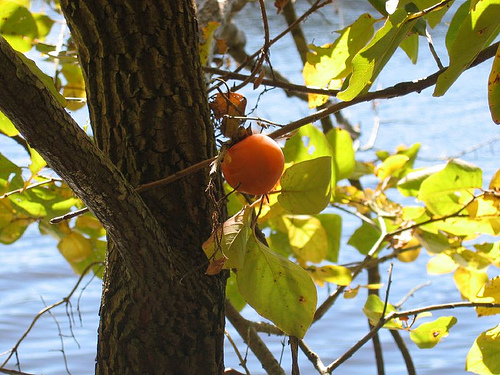
Ripening persimmon, Diospyros virginiana.
(*photo
credit)
October 15, 2007 Injustice
Pope Paul VI spoke of focusing on establishing justice in
order that we may have a more peaceful world. His quote to that
effect will be repeated often this Peace/Justice Week. But it may
be worthwhile to recount the types of injustice that exist so that
we can select areas where we can focus on establishing justice.
Personal injustice: Backbiting, substance abuse, cruelty,
abusive language and actions; overlooking the needs of others
around us; failure to give respect to self and others.
Local social injustice: Forms of discrimination against other
races, creeds, ethnic groups, migrants, or those of one or other
lifestyles that do not suit our tastes: ignoring the unemployed or
those who are underemployed; blacklisting certain individuals or
groups so that they find life hard; shunning and calling
individuals derogatory names; lack of adequate and affordable
housing; excessive tax rates on those who are indebted.
National social injustice: Unfair taxation systems that put
heavy burdens on the lower income people and grant excessive relief
to the wealthier members; an unjust health system that
discriminates against those without health insurance; lack of
proper care of those injured by war; lack of proper law
enforcement; excessive incarceration of non-violent offenders.
Global social injustice: The above categories of
discrimination along with those against tribes or particular
religious sects; failure to share with the destitute and those
vulnerable to disease or lacking educational opportunities.
Economic injustice: Failure to see that all have the right to
meaningful employment; failure to promote a living wage; allowing
the excessively wealthy to dictate laws and erode democracy;
allowing the airwaves to be taken over by a privileged few;
allowing retention of the commons that must be shared with others;
waging wars for economic gain.
Eco-injustice: Poaching and attacks against threatened and
endangered species; air and water pollution in all its forms;
destruction of the rain forests and temperate forests as well;
waste and overuse of resources; lack of sharing land resources with
others; destruction of habitat and flyways for wildlife;
overfishing of the oceans; all forms of sound/noise pollution.
Injustice to past generations: Lack of respect for the graves
of forbearers; belittling the achievements of those who went
before; forgetfulness of the sacrifices to make us who we are.
Injustice to future generations: Climate change that will
affect the lives of many in the future and the horrible
aftereffects that will disrupt entire cultures; poisons and toxic
wastes that must be guarded lest they harm to future generations.

The "Pasty," a vegetable stuffed pie, ethnic Cornish meal, used
traditionally in the
U.S. by immigrant miners in upper Michigan and Wisconsin.
(*photo
credit)
October 16, 2007 World Food Day Revisited
World Food Day is celebrated each year, and one might say that
we said enough two years ago (10/17/05) when we first considered
the day. Since then several developments have transpired that make
the problems of world food needs and distribution all the more
urgent.
Climate change is taking a toll on food production. In the
intervening two years, weather patterns have been changing; the
changes could be called a fluke but the records indicate that this
may not be so. Some areas are getting dryer and some wetter, with
the resulting droughts and floods affecting local food supplies in
poorer lands. A report on conditions on the island of Crete and
the Greek mainland shows the hot dry weather resulting in both
fires and water shortages that are affecting traditional irrigation
practices -- and watering crops is the major fresh water use.
Biofuels are replacing food crops. Turning corn into alcohol
to use as auto fuel to substitute for petroleum has a direct impact
on folks who regard corn as a food staple for their simple but
adequate diet. Increasing prices of feed corn are also affecting
meat, dairy and egg supplies and prices. While some in extravagant
vehicles waste their corn-derived fuel on joy riding, others are
deprived of necessary food supplies through rising prices and corn
shortages.
Changes are occurring in diet. China, India and other
developing and rather prosperous nations demand more intensive food
as diets for the rising affluent class change. It takes more crop
resources to produce animal-derived food than to use the same grain
for direct human consumption. This forebodes badly for the poor,
for more and more arable land formerly used for rice, wheat, corn
and other grains is now being used for making these animal products
or growing fruit and other higher priced crops.
Distribution is giving way to local production. On the whole
this development should be a salutary move provided the effort is
taken to make surpluses available for times of famine when local
production does not meet basic food demands. The expectation that
local farmers can feed the malnourished population is healthy,
provided richer countries are willing to extend financial and
possibly material support to lands when shortages appear. Some
countries refuse to take care of their own. In both Zimbabwe and
Sudan many people are hungry or even malnourished. What must the
world community say when some nations do not satisfy their own?
Could addressing these four developments make a difference?
Two years ago on World Food Day we realized that 30,000 infants and
children up to age five were dying per day from malnutrition or
related diseases. That number has apparently not declined. That
gives us pause, for this is a form of terrorism that we who eat so
well and forget so easily must address.

A solitary ear of field corn amidst harvested field. Woodford
Co., KY.
(*photo
credit)
October 17, 2007 Isolation, Never Again
In much of the nineteenth century the United States sought to
flourish in isolated luxury. It peeped out to battle Spain and
capture the Philippines and thus set its gaze beyond the Western
Hemisphere to Asia and the vast regions of Oceania. But an
atmosphere of isolation persisted. The First World War came and
great effort was made to avoid entry until the last year and a
half, and so American doughboys marched into France to assist the
battered allies to come to final victory. They returned home to
the glory of twentieth century isolation when the world was
expected to be safe for democracy. That did not turn out to be,
and so the GIs headed overseas again in the 1940s to North Africa,
Italy and Normandy and the many scattered islands of the Pacific.
Peace came at last but not blissful isolation. The world had
become too small, and now there was a "Pax Americana" that demanded
bases in Korea, Japan, Germany, Italy, England and on and on. The
twelve million service people were not completely mustered out in
1945. We no longer had a skeleton peacetime army for now we faced
the Red tide of the USSR and China. Isolation would never return,
as the headquarters of the United Nations organization was
established in New York City -- no more League of Nations that the
United States could refrain from joining. Things had changed and
the land of almost half of the world's industrial production in
1945 had to learn to give, lease and lend some of the vast
resources to the needy overseas. We did so and the world became
our neighborhood. Splendid isolation was receding but not gone.
Americans even started to play soccer (the other peoples'
"football"). But did isolation disappear?
We give our attention to local and national issues and neglect
international events. But not totally. Our self-interest takes us
afield -- defense, oil, other resources. Iraq is important and so
are supposed terrorist nests in distant places. But we can still
allow isolation to creep back in; we can neglect the needs of our
brothers and sisters in distant lands. We are isolated when we
give virtually no news coverage to the many countries of Africa or
Asia. We are isolated (on this Fourth World Day) when we lack a
feeling of compassion for those who do not have sufficient food or
medicine. We practice isolation when we shut out those who aspire
to reach our unsustainable standard of living.
Isolationism does not leave us easily. Our land is large and
has its many problems -- but so does the world that is our new
neighborhood. Even if in our heart of hearts we would like to be
isolated people, we simply cannot be. Television and the Internet
have done so much to change all of that and bind us together. Our
neighbors are not just those living next door; now we have
neighbors on the other side of the globe and their agony enters our
living space with an infrequent news special. There is a world out
there, and we are part of it. Yes, looking back on isolation is
nostalgic but somewhat unrealistic. America is more mature now and
the Fourth World is really our immediate world as well.

Hematite Lake, near Cadiz, KY.
(*photo
credit)
October 18, 2007 St. Luke and the Journey of Faith
In this Cycle C Year many Christians focus on the Gospel
of St. Luke. We have an opportunity to see that Luke's imagery of
travel tells us about Christ in the Gospel and the early church in
the Acts of the Apostles. The two books together give us some
practical suggestions on our own journey of faith. Taking the two
books as a single whole lets us review some hints for guiding us on
our journey.
* History -- Recall the events in Christ's younger years
(Luke's infancy narratives, Lk. 1-2) and come to appreciate the
role of our parents in setting us on our own course of life. The
humility and activism of Mary is expressed in her journey to visit
Elizabeth and the Magnificat proclamation. The closeness of the
Holy Family is exemplified in the exile into Egypt. The narrative
of the infant Church is quite similar.
* Vocation -- Give a special emphasis to our calling and the
start of our own journey (Lk. 4 and Acts 1 ff.) as Jesus quotes the
prophet Isaiah as to the message of liberation. Recall the
movement of the Spirit within us as at the Pentecost event narrated
in the first part of the Acts. See the need for practical
guidelines for evangelizing and spreading the Good News as we go
(Lk. 10 and parts of Acts) -- travel light and know when welcome
and when to move on.
* Healing -- Know the importance of healing in our lives and
remember episodes on the journey when others redirect our ways (Lk.
15, the Prodigal Son) and help us when we are injured (Luke 10,
the Good Samaritan). Healing confirms St. Paul's observation of
"Luke, the beloved physician" in Colossians. Also our own
forgiveness of those who offend us is of utter importance as a
basic attitude in healing fractured relations in our world.
* Sensitivity -- Traveling light allows us to become aware of
the destitute who happen to enter our path and make us all the more
aware that we must do something about these folks (Lk 16, the rich
Man and Lazarus).
* Prayerfulness -- Jesus teaches us to pray always and to pray
with persistence, humility and simplicity (Lk. 18) and the apostles
give us numerous examples of prayer times when they gathered
together and served in prison (Acts).
* Special attention -- Jesus gives special attention to others
even in the midst of his passion and death (Lk. 22-23): to Peter,
to the women on the way to Calvary, and to the good thief while on
the cross. This tells us that as our own journey ends we must
always be mindful of radically sharing with our neighbor even at
the moments when we give up everything we have.
* Enduring faith -- The Resurrection became the opportunity
for Jesus to teach others on the road to Emmaus so that they could
carry the Good News to those who were isolated and afraid. We too
must find in the Acts of the Apostles the dynamic of faith that
sent the apostles to all parts of the world. We wonder how
faithfully those who follow us will carry on and spread the faith
we cherish in the years to come.
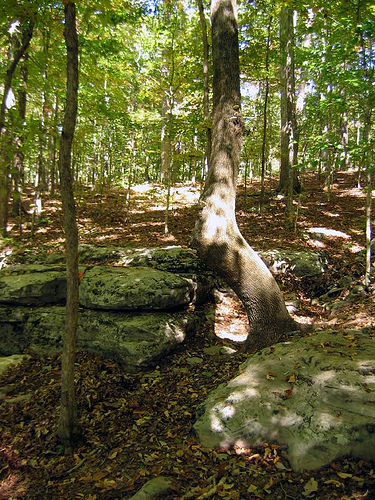
A microkarst outcrop with trees in autumn color.
(*photo
credit)
October 19, 2007 Knowledge: Acting through Proper Experience
During this season of Pentecost we are treating one of the
seven gifts of the Holy Spirit each month. Now we focus on the
fifth of these gifts, namely knowledge. In the traditional way of
speaking, this gift of knowledge means we realize the path to
follow and the dangers to avoid in order to reach heaven. In our
journey of faith we encounter many detours and road blocks that
divert our attention. We can get off the track and that wastes
much precious time; and we can even lead others on the wrong
detours of life as well. The Jim Joneses of the world lead astray
entire communities, even to an incredible mass suicide.
Allurements are all about, even on this Internet -- and these
become the detours and barriers for many good folks.
Knowledge or spiritual experience is the answer. It is like
looking up when biking and seeing what lies ahead so some allotment
can be made for hills and dangers. Such journeys also need the
collective experience of fellow travelers on the journey of life.
We are in this together; we can learn from others' mistakes and
they can learn from ours. So knowledge, more so than the preceding
gifts, has a communal character that needs to be fostered and
encouraged. Gifts are given, but the gift of knowledge is to be
shared in a special way. As those who benefit from the gifts of
the Spirit -- the wise, understanding, judicious, and courageous
people -- we need to discern collectively.
We are free to act and we are on a journey; the way the
journey proceeds depends to some degree on our free choice. For
instance, to discern that one's lifestyle must be changed in order
to be more conservation-conscious may require wisdom,
understanding, counsel and fortitude, but it also requires going
counter to acts of pharisaism and includes profound and meaningful
actions that benefit ourselves and our community. Establishing
the Kingdom of God on Earth will take many small actions and
involve all the expertise we can muster. We cannot remain
inactive; we need to act in order to be true to our vocation, and
we must do this by using the virtue of prudence. We often think
that sheer practicality is less important than to the dramatic
feats of the more charismatic person. But we are working in the
real world inspired by the Holy Spirit. We must commit ourselves
to using the appropriate tools for the benefit of all creatures on
Earth and often this is hard work and not a showy exercise in
drama. And this is to be a cooperative endeavor.
Details are important, and these are often de-emphasized by
those involved in heady reflections. But activists know better.
Look at the details and find out what is needed and recall that the
Kingdom of God involves numerous planned concrete deeds. If we say
that a lifestyle change is needed by an individual or group, the
change ought to be appropriate, that is affordable,
environmentally benign and community-oriented. Thus we need to
weigh options and find which actions are feasible and will benefit
the common good.
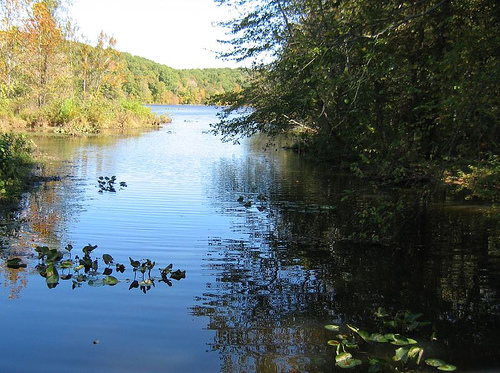
A quiet pond in autumn, lily pads still green.
(*photo
credit)
October 20, 2007 Morality and Nuclear Power
Soviet foreign minister Molotov wasted no time asking
Secretary of State John Foster Dulles what on earth the Americans
thought they were doing proposing to spread weapons-grade nuclear
material all over the world (Ike's Atoms for Peace program).
(The Ruin of J. Robert Oppenheimer, p. 257)
In our current Special Issues we treat the morality of nuclear
power generation. The history of nuclear power use is a sorry
story of deceit, ignorance and economic profit at the expense of
human safety. Electricity generation through nuclear power has
become a thin cover to allow for wartime business as usual --
namely production of armaments while production of fuel continues
at a fast pace. Such undiscerned activities have corroded the
moral position of possessors of nuclear power to such an extent
that the very existence of civilization is endangered -- and yet so
few seem concerned.
After a hiatus of several decades when nuclear power
generation was often regarded as unsafe and waste disposal problems
went unsolved, a renewed emphasis on the use of nuclear power is
emerging due to the global warming controversy. Even here, the
carbon dioxide emissions from nuclear materials processing are
overlooked and negated when in actuality they have been
considerable. Thus a costly, unsafe, unnecessary and tempting
peacetime use haunts us today because we are people still riddled
by the guilt of civilian deaths in Japan in 1945. However, new
economic considerations seem to be gaining a hearing.
Limiting our discussion to peacetime nuclear issues is still
inherently complex because the wartime and peacetime uses of the
atom are interconnected, and it may be that in some countries
current peacetime uses are excuses for weapons development and
buildup or at least are a temptation to produce nuclear weapons.
The morality of nuclear weapons production, retention and use has
been discussed for decades, but seldom in conjunction with nuclear
power generation. We need not repeat what has been said as to
production, retention and use of nuclear bombs; the website
<www.himahima.co.jp/PeaceWeb/Peace/E/pNuclear2 I.html> lists some
nineteen times when the weapons' deliberate use was discussed
within or among the nuclear powers -- and this discussion goes on
today regarding Iran. However, ends never justify such means.
Moral questions about nuclear power arise and take on serious
ramifications depending on benefits of the tools used, the maturity
of the user, and the immediate surroundings where used. Granted
some nuclear materials may benefit people; these are not
necessarily derived through nuclear reactors that can ultimately
furnish fuel for weapons. Even the strictest controls are not
sufficient to keep the plutonium produced in these reactors out of
the hands of terrorists. The electricity can be generated in other
ways and so the use of nuclear fuels is simply unnecessary as well
as a potential source for nuclear weapons proliferation.

Indian pipe, Monotropa uniflora.
(*photo
credit)
October 21, 2007 Perseverance
"Pray always without becoming weary." (Luke 18:1)
Jesus tells us once again about prayer and yet he is aware
that we can become weary and want to give up. This may happen to
someone in prison for the wrong cause, for the person struggling
for life in a hospital, or the laborer who is barely making ends
meet in the daily struggle for life. Our prayer and life are
intertied, and weariness when there is no end in sight is quite
common to many. Jesus encourages us to come to him in the utter
weariness in which we experience our life's journeys. I remember
a persistent widow who complained about how coal operators had
destroyed her road and she persisted in her complaints.
Many carry on for economic reasons and yet some give up and
observe spiritual fatigue. We all experience fatigue in some or
many ways: with the war in Iraq; with candidates for public office
who repeat the same story over and over; with people who think they
have been wronged by others; with those who focus constantly on
their own health to the detriment of others who suffer as well;
with those who seldom get enough sleep; with the ones who
constantly seek help but do not avoid their own difficulties.
Do we remain confident that our prayers will be answered? We
started praying a while back and expected miracles of grace in the
next short while -- so we would not have to persist in our prayer,
and we were wrong. We know that God always answers our prayers.
Are we willing to continue to pray, trusting that God is answering
our petitions now or very soon? Shouldn't we pray that we hear and
understand the answers that God is actually giving us? And do we
have faith that God is a ready and fair judge who acts in
sufficient time for our hopes to be realized? The Almighty is not
overcome by other cares and concerns. We are heard when we call
and we are moved to call again and again.
Encouraging the weary is one of our best forms of service.
And we must be mindful that we ourselves do not weary in prayer,
that we believe that we can persevere and that others can also. We
believe in the power of persistent prayer and thus we continue to
call over and over -- and never lose heart. That takes a certain
courage. We believe that sincere prayer to God is always answered
but not always in the way we first desire. In fact, part of prayer
is the maturation that we undergo in realizing what God's will is
in this matter for which we are praying. We gradually come to see
that God prepares us for the answer. Faithful prayer is quite
important or else our encouragement becomes somewhat hollow for
others. We may be required to pray in a different manner: a
change of posture, location, time or style; a movement to reading
something spiritual before prayer; a special request to the Lord
that is made after new praise and thanksgiving; or enlisting others
to pray with us for some long-term solution -- always saying that
God's will be done. But let us not cease in praying, for our
perseverance is needed in this troubled world.
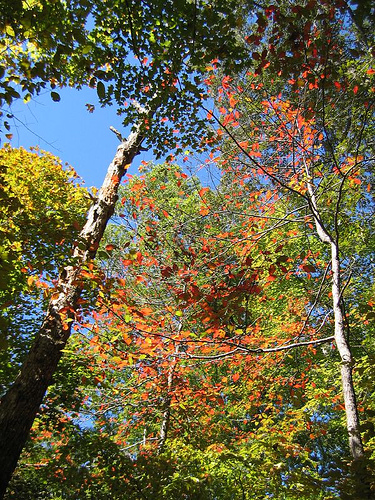
Autumn foliage, Land Between the Lakes.
(*photo
credit)
October 22, 2007 October Is Passing
A friend told me that when his mother passed away, he broke
the news to her best friend and the old lady said, "Thus glory
passes." The precious relationship she had with his mother was
broken with a certain definitiveness -- and October, that season of
passing, is the time of this changing of the guard -- the passing
period. We also celebrate this as National Cleaner Air Week and
know that autumn's passing from the heat of summer also brings abut
the freshness of winter and the anticipation of a better
atmosphere.
We use the term to "pass away" in place of dying, and there
are some good faith-filled reasons for that -- not just a refusal
to face death. For those of us who believe in the resurrection of
the body, life is a passing from one form to another. The Passover
harks back to Old Testament themes of passing from Egypt to the
Promised Land and from old ways to new ones. In the New Testament
Jesus' Passover is observed as part of the Last Supper and beyond,
and so Christians celebrate the Passover event each Holy Thursday.
The passing of the seasons includes faith-filled concepts as
well. Yes, the beautiful scenes of summer have passed over to the
colorful leaves of autumn, and these have a certain transitory
nature that allows us to find their presence somewhat bittersweet.
We will pass over to winter but not eternal winter -- for we have
a promise of a spring and new life to follow; thus we do not see
this season as passing to a permanent winter condition -- just a
seasonal change. We need our sleep; so do plants and animals need
their rest. Thus we come to the non-growing part of the year.
Until recent years I never really liked autumn because it
meant the end of the greenery of summer. In youth I hated to go
back to school in the fall. With age my favorite season shifted to
the autumn for even the passing of the leaves gives a promise of
cooler days, a freshness that is now so welcome. We like the
crispness of an October morning when frost covers the landscape
reminding us that summer is gone for another year. Frost is a
welcome blanket for a sleeping Earth. However, the winter ahead
may prove harder to endure than life in summer time. So we are
tempted to see October's passing as an older order of tranquility
that could usher in an unpredictable ecological winter. Autumn is
then a call to protest against human greed and mismanagement.
Autumn is when golden leaves seem to twitter and dance to the
slight breeze, and then flutter down to join the fallen. Thus
glory passes. The beautiful maples and sour gums, the oaks and
elms have their own singular passing to rest while awaiting a new
springtime. Let's make this October a rededication to the vitality
of all things around us. We redouble our efforts, for so much
could be passing away if we do not do our part. Let's ensure that
October is a transitory passing, a rest before new birth -- not a
time of eternal death, which is at least a possibility.
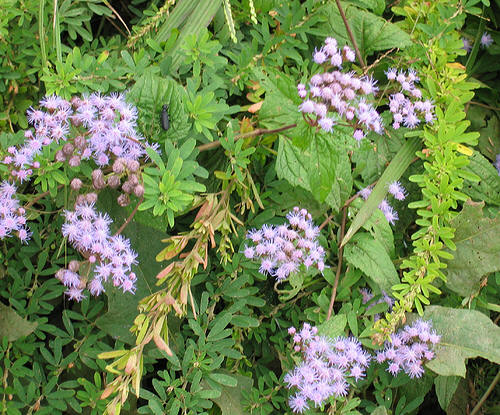
Mistflower, Conoclinium (formerly Eupatorium) coelestinum.
(*photo
credit)
October 23, 2007 Priestly Service and Prayer
We will hand over this duty (giving out food) to them
(deacons) and continue to devote ourselves to prayer and the
service of the word. (Acts 6:3-4)
Each of us has a role to play in our troubled world. With
time we find our talents and our place after much trial and error.
That is the experiential approach to life. This applies to all
parts of life even our specially assigned ministries. As those
talents and that ministry differ so the ministry takes on unique
characteristics. This is certainly the case of my ministerial
priestly service, especially in relation to the situation today.
The prime example of this ministry is not academic studies but
rather the model set by Jesus of washing the feet of the disciples.
We start in humble service -- and the more we observe by working
with others who are humble, the more we see that God's ways are not
our ways. Those in lowly service take the lead and those in high
places are brought low. And we must be leaven and thus immersed in
the dough of struggling Earth herself.
In the past few years we have come to the realization that
this is the first generation of people who through their own faults
can harm the Earth, damage it irretrievably and even destroy it as
a habitation for human beings. If we do not believe in a future
after we are gone, then our idolatry of self will crush us and
hasten that destruction; if we believe in a future, then we
prepare for it. Priestly service stands at a new threshold.
Ministerial priests focus on two areas designated in the Acts
of the Apostles at the institution of deacons to handle the tasks
for the poor. The apostles were to devote themselves to prayer and
service of the word -- spreading the Good News. Commentators tell
us that prayer meant the formal liturgical prayer of the Church --
the life of the sacraments and especially those of reconciliation
and the celebration of the Eucharist. Through reconciliation those
in the community who are wounded are healed and brought into full
community life; through the Eucharist the spiritual nourishment of
sacramental life in Christ is given again and again.
All must be nourished and the role is so utterly important. We
recall Athanasius' manner of reasoning to the Trinity from the
immensity of the redemptive act; only God as food is sufficient for
us to be nourished for the godly work of saving our threatened
Earth. We enter into the union with the suffering Christ of
service and we do so in a deadly serious fashion. Only God's
presence can keep us to the task at hand, a task for all the People
of God. Our unique role as priests is to furnish the Bread of
Life. The same holds for the deadly serious role of being shriven
people, liberated from sin so that we can all concentrate on the
utter liberation of Earth itself. The uniqueness is in this
singular priestly ministry -- not in the manner in which we conduct
the formal prayers -- for rubric is rather uniform. It is an
essential service.

Overlook in autumn along the Natchez Trace, near Tishomingo,
MS.
(*photo
credit)
October 24, 2007 Service of the Word
Missionary activity, which is carried out in a wide variety of
ways, is the task of all the Christian faithful.
(John Paul II Redemptoris Missio)
This service of the word is not limited to the clergy by any
means. For a long period the emphasis was on that service by all
the baptized in the Lord. Go out to the whole world; proclaim the
Good News to all creation (Mark 16:16). Going therefore to all the
world is the work of all, not just a few but each of us goes in his
or her own unique way. This service of the word, the second
priestly function, has the same basic content for all the baptized,
but that content itself though faithful to Scripture and Tradition
is still specified by personal talents, local situations, cultures,
and the times in which we live. The manner in which we deliver the
Good News depends on ourselves, our place and our time and thus is
unique in some degree to who we are.
In spreading the word the priest does not have a hidden gnosis
but something unique could spring from the office. This difference
may rest in the powers mentioned in the context of the formal
prayer. The priest is more acutely aware than others of the
unworthiness of the one praying; he is likewise aware of the
poverty of person, sparsity in fellow workers, and most importantly
the urgency of the time and place (shortness of time and hostility
and distractions of hearers of the word). He knows the poverty of
diminishment and loss of energy, the loneliness of ministry, and
the lack of completeness in the mission. The priest is aware that
the harvest is great and the laborers are few and strives to make
up some of the difference. The urgency demands an enthusiastic
response that is unique to the priest. The word must be spread
even amid the formidable difficulties that are before us.
The uniqueness of the priestly ministry within the Church now
filters to the individual who suffers with Christ in a special way.
We say with St. Paul, It makes me happy to suffer for you, as I am
suffering now, and in my own body to do what I can to make up all
that has still to be undergone by Christ for the sake of his body,
the Church (Colossians 1:24). What is wanting is not the total
redemptive act, for Christ alone saves this fallen world. But
salvation's full effect comes in the sacrifice of Calvary made ever
present, and this involves the suffering of people in whose hands
the priest makes an offering. Christ saves the world; we must
help save our wounded Earth. In some mysterious way this is one
redemptive act in which we as the Church's ministers feel an every
deepening commitment. We mingle our sufferings with his. Through
our suffering we are to experience his redemptive act in the toil
it takes to save our wounded Earth. Earth is being saved in
Christ, and we must urgently announce the word. Paul suffered
within a hostile Rome Empire and served the word over the excellent
highway system of Rome. We must suffer in our secular world and
yet are blessed with a new global electronic highway system, the
Internet. Thus we spread the word on modern pathways.
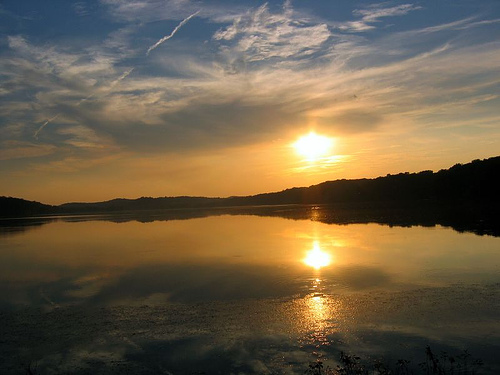
Sunset over Lake Barkley. Kuttawa, KY.
(*photo
credit)
October 25, 2007 Service and Numbers
Should we soften our message and make it more palatable to the
masses? Or honestly, is the question, should we speak more
convincingly to the elite of this world? Are these questions
concerning spreading of the word not somewhat similar to what was
asked before -- to the elites of Greece who were the "citizens"
apart from the slaves; to "citizen Jacques" of the French
Revolution who was divorced from the first and second estates.
The format for spreading the word depends on the audience --
even its size. In the New Testament, numbers did mean something as
seen in the multiplication of the loaves, once four thousand (Mark
8:1-10) and once five thousand (Luke 9:10-17). Yet Jesus spoke at
length to Mary and Martha and to his disciples on a one-on-one or
one-of-a-few basis. Jesus went out to the many, for they were
hungry for the word -- and yet many did not fully understand, and
Jesus spent time with few but these also lacked understanding.
Success is not the primary criterion.
We vacillate between ministry to the few or many. To spread
the word to a few is usually looked upon with deeper respect than
to deal with the many -- because crowds are harder to control and
the few are thought to be more profoundly changed. The many are
democratic and a potential popular movement; the few border on
elitism where the few can rise to leadership roles in a more
aristocratic setting. At times priestly service appears more
directly an elitist approach rather than the popularist one, though
one may never know which approach is ultimately more successful.
If one really believes that the divine option is with the
poor, then the popularist approach seems most fitting and more than
ever so today in our democratic society. If we have an option to
focus limited resources, then let us opt for the poor for they are
grater in number. And let us hope the chosen few will find merit
in this approach and join the democratic process. Catering to the
few can lead to a self-importance of the few that is harmful to
them and to the ministry as a whole; it consumes the energy needed
to spread the Word to all. Some advocate instructing a few well
and let them proceed through a "trickle down evangelization." Or
one could say that by instructing the many as part of the crowd
called to speak out, a groundswell will be caught up and many
leaders will emerge -- but these become the few coming from the
many. A popularist opts for public interest and not academic work,
for the importance of the yeast is its immersion in the rising
dough, not in a few special sweet rolls.
Ordination is a public act for the many, not for the few --
though monasteries could be exceptions to that rule, for there the
few need ministry also. Priestly ministry of spreading the word
means that we constantly evaluate whether the message is reaching
out to the world. This act of reaching out needs to be explored
in greater depth in this age. Priestly ministry is in the middle
of this, but what does it really mean?
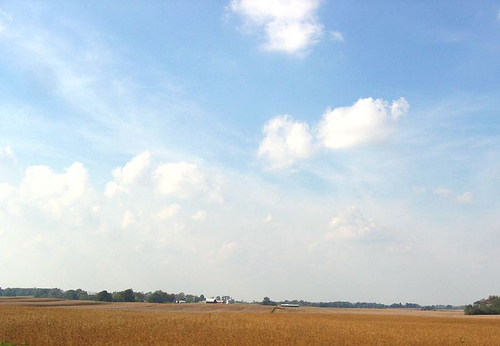
Autumn dried grasses, blue sky above. Eastview, KY.
(*photo
credit)
October 26, 2007 Indoor Physical Exercise
Virtually once every season we emphasize the need for physical
exercise. All too often the manner of expression (walking, hiking,
jogging, biking, and gardening) has been generally exterior
activities Some add to that category the touring car, ATV or
motor camper in which the major exercise is entering, exiting and
pumping gasoline. Autumn's cooler weather gives way to rain and
snow, times we stay indoors because we can not bear to get cold or
wet. But we should engage in a healthy balance of the exterior and
interior type of exercise, and even come to prefer the latter if
that means continual day by day routines that are good for human
health. Some doctors recommend a minimum of a half hour to one
hour of some kind of daily exercise.
Some folks reside near workout "exercise" centers and join the
clubs and organizations that cater to better health. They may have
a special exercise machine or series that they use on their visits,
and look forward to a good workout. It may be an indoor jogging
machine or a stationary bike, or any number of weight-lifting
devices ranging from hand bell bars to strenuous body-building
devices. Others may find these clubs and machines somewhat overly
complicated or daunting and prefer to work out privately at home.
For them yoga or other individual exercises may be the choice.
They may watch a tv exercise program, a virtual gym at home, and
not care about their appearance or apparel. Other distracting and
perspiring human beings are far away. Whatever the choice, gym or
virtual gym, it is certainly better than no exercise at all --
provided we can refrain from overdoing a good thing.
I have come to do indoor physical exercise daily and the
outdoor variety on a more occasional or even weekly basis. This
started in the hot summer that has just gone past and the fear that
over workout could be the end of all exercise. My friends, the
Purcells of Los Angeles, provided a rowing machine, which has
proven to be just the thing for a half hour a day (600 strokes) and
keeps legs, arms and mid-section in improved shape and with less
back ache that comes through jogging and excessively rapid walking.
This daily indoor exercise, if performed on a heavy duty machine
that does not overheat and wear out too easily, is highly
recommended. The rowing machine can collapse and fit into a
confined space; it does not require electricity to operate as do
some of the varieties of treadmills; it does not demand
coordination of too many body parts and elaborate technical
devices, plugs, strings, handles and other devices; while
monotonous, it is not quite as bad as the stationary bike; nor does
it take gasoline, for those who regard exercise as riding in a car
and moving the gas pedal with one foot. The time goes quickly when
combining the exercise with a meditation, for so little thought is
required in the operation that it has the same effect as a
breathing exercise while meditating. Double up the time of
physical and spiritual exercise and feel better in the process.
But most of all, get that daily exercise for a more healthy outlook
on life.
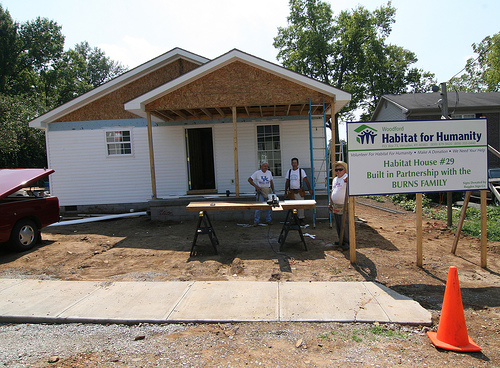
Habitat For Humanity, Volunteers working in Woodford County,
Kentucky.
(*photo
credit)
October 27, 2007 Habitat for Humanity
Once a month we feature a non-profit organization or cluster
of organizations. After three dozen we do not want to omit those
groups working for decent and affordable housing for the homeless
and those unable to obtain a home under their present economic
conditions. Thus non-profit housing groups are our feature of this
month.
Habitat for Humanity is an ecumenical Christian housing
ministry that welcomes the work of people of all faiths to build
decent and affordable housing for low-income families around the
world. Habitat started in 1976 through an awareness of the global
need for better housing for many people (today's estimate is about
one and a half billion people). It started small and has grown
into worldwide organization with over two thousand affiliates in
nearly one hundred countries. The website says that in the past
three decades over 125,000 structures have been built through
Habitat sponsorship -- and that number is growing each year.
Former U.S. President Jimmy Carter is Habitat's most famous
supporter and annually leads the Jimmy Carter Work Project. Other
notable personages including presidents and governors have donned
work clothes and helped on Habitat projects at various times and
places.
The organization is somewhat decentralized with the local
management having charge of choice of sites and those in need, of
the specific structures and manner of construction, and of the
organizing of crews and supervision. The main office strives to
help with resource information about energy efficiency,
construction management, housing design and issues related to
healthy housing.
Habitat is quite capable of responding to disasters as
happened after the Katrina Hurricane and the 2005 Asian tsunami
disaster. The organization can be in the forefront of housing in
countries and regions where the poor are overlooked and forgotten.
The decent home becomes a model of what can be built through
cooperation and willing effort. The beneficiary is expected to
take part, as far as able, in both the construction of his or her
home and in continuing projects in the local community.
From an Earthhealing perspective, Habitat offers considerable
potential for introducing new and low-cost appropriate technology
methods into building design. Some of this is already occurring
but much depends on the creativity of local organizations.
Furthermore, the completed structures offer models for others to
see and imitate whether within the Habitat structure or on another
local initiative. The goal is decent housing, and that goal is
something that will help heal our wounded Earth.
For more information and to find the nearest local affiliate,
contact Habitat for Humanity <www.habitat.org>.
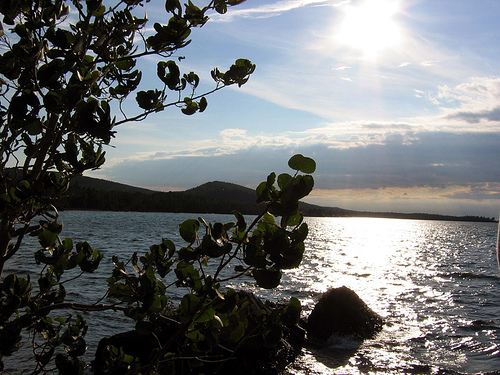
Norway Lake, evening scene. Ottawa National Forest.
(*photo
credit)
October 28, 2007 Simple Prayer
"God, be merciful to me a sinner." (Luke 18:13)
Sometimes we are asked to comment critically on another
person's prayer life during an evaluation. I find this extremely
difficult, if not impossible, and wish such questions would never
be asked. Unfortunately the Pharisee in today's parable may be
regarded as having a rather formal, ostentatious and well-known
prayer life -- but really how would we evaluate his prayer life?
How do we know if another person prays or, better, how do we know
whether the very simple prayer spoken from the heart by a soul who
is heavily tortured is not deeply sincere and heard clearly in the
courts of heaven? There are times we do get hints that some pray,
especially the elderly who think they have lived beyond their time
and tell us that they thank God each day that they have had so many
gifts. Such are the simple prayers of life.
All too often the prayers that come from simple folks really
show a basic attitude like that of the tax collector who knew he
was despised and yet knew he had been sinful in his own ways. He
recognized his condition before God with a fully open heart while
the Pharisee brought forward a lot of clutter and baggage along
with his own comparison to that despised tax collector. Maybe we
can learn a collective lesson. We can hardly expect to be exalted
in prayer when so much of the troubled world surrounds us and we
are so much a part of its present condition.
In many capacities I have observed simple prayerfulness -- in
the hospital even among acknowledged non-churchgoers who are sick;
in our assessment work when we were invited to attend an afternoon
mosque service; at times when the family seeks to pray before a
meal; and when people gather to say some prayers at the bedside of
a dying person. I will never forget the simple offered prayer of
a prisoner who prayed so sincerely that those of his family he hurt
by his imprisonment would be well and would recover from the shock.
These simple prayers in a worshiping community teach us to pray
better; we discover that many pray in humble ways and we wish our
prayers could be the same.
Simple prayers come in many varieties: "Lord have mercy on us
all," the repetition of the "Our Father" or "Hail Mary" said while
meditating on religious mysteries of Christ's life (the rosary), or
the "Jesus Prayer." Some prefer their simple prayers to be a
private conversation with the Lord in their own words and out of
earshot of others. They come to realize that there is no special
time or place but a breaking open of the heart to prayer as
naturally as talking to a friend. Perhaps today's parable tells us
more about where we are. Are we the simple praying type just
mentioned? Are we instead always comparing ourselves with others
in regard to church or civic duties, on whether we vote or take
care of the lawn? Or do we sometimes vacillate between the two
positions. If so, this parable calls us back to the basics of our
relations with our God.
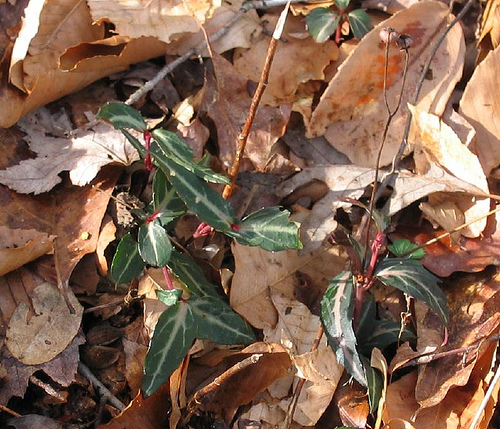
Pipsissiwa, Chimaphila maculata.
(*photo
credit)
October 29, 2007 Catastrophe: Live within Our Means
Some seventy-eight years ago today the stock market lost 40%
of its worth on "Black Tuesday." It was a financial catastrophe.
That event becomes for us an opportunity to reflect on lessons
learned in history, for it led to much pain, financial troubles and
ultimate frugality as people struggled to make do.
Some people speculate that the only way to shake our people up
in their race for easy credit, rampant consumption and growing
indebtedness is for a catastrophe to occur. It shouldn't happen to
good students of history -- but then history really never repeats
itself. There is perhaps some truth to the expression, "It won't
happen again," but some quite similar things could happen. For
years I have shunned the idea that catastrophe, not history, is the
best teacher. But in the last year my mind is changing: a mild
catastrophe is certainly better than a war or massive loss of life
through natural disaster. If the undoing is financial, so should
the corrective be and hopefully without a bloody aftermath. Maybe,
just maybe, a good financial readjustment will be a good thing.
For Mother Earth needs to settle down, and this may be a way to do
so, namely, by curbing the consumer practices of our people.
It appears that this readjustment could occur in one of four
ways: dictatorial decree, voluntary change, strict regulation, or
catastrophe. Our nation is a democracy and not a dictatorship;
voluntary ways lack the power of rapid conversion of more than the
choir; strict regulations require the will of legislators and these
are too much like the rest of us; so for many commentators the only
choice left is an outside force, a natural catastrophe or an inside
force, an economic or human-made catastrophe. If this does not
include guns and blood, maybe it would be for our betterment. Who
is to say that the loss of billions if not trillions of dollars of
value in stock worth is not mild if it teaches us a vital lesson?
Live within our means. The manner in which a consumer
oriented-culture has been consuming resources is unsustainable.
Greed has been running riot. A corrective is then most welcome.
If the developers are brought to their financial knees and cannot
continue with present practices, then both Earth and the consumers
who are living so unsustainably will all gain much. Earth will
have a much needed sabbatical; consumers will quiet down and stop
building bigger and bigger boats, cars, and homes. They will live
more simply and closely to one another like the poorer portions of
the human family. There is no guarantee that they will not
continue grasping for what they can get, but then there is that
faint chance that they will wake up to how to live within the means
allotted by a providential Creator. A shock treatment may do the
trick, and a financial disaster may be the wake up call. Maybe we
should never pray for a catastrophe, but when I think of the
continuation of how things are now going, a severe event might just
be the best that can happen to us -- provided people don't start
jumping out of skyscrapers.

Musician's hands with hammered dulcimer.
(*photo
credit)
October 30, 2007
Faint Voices in the Hills
Autumn brings nature's fainter voices,
When frost makes croaking frogs still,
And mutes the sound of growling corn,
And drives to deeper south the whippoorwill.
It's time to listen to the mountains talk,
Even the scarred ones are callin'.
Takes more than ears to hear harmed hills;
After all the leaves have fallen.
Highlands tell us folks a story
of cosmic heaves and birth,
When in a prayerful gesture
They burst through the crust of the earth.
Unshakable mountains? Not so. They quake,
Rise and fall, melt like wax,
Bow low to greater majesties,
Find time to sleep a million years -- and relax.
They tell how the creator favors them:
Rest of ark; laws' carving place;
Summits of beatitudes; transfiguring site;
Springboard of prophets; ascending space.
Mountains also suffer from human greed,
Robbed, stripped, beaten, crucified,
Footprinted by backhoed treasure seekers,
Wasted by macho pride.
You laugh in utter disbelief?
If God really loved them so,
Why are these mountains barren now,
Where not even briars can grow?
You say God has no favorites. Not true.
The mountains are, we know.
How come we know? The Good Book and
Nameless hills tell us so.
See any discarded knob or ridge
As nature's heaven-pointed steeple.
Let the mountains and hills bring
A message of peace for all the people.
Hear our wounded hills faintly say,
"Peacemaking power you'll find
If you but reclaim us now,
For wounds unattended do violence to all humankind."

Ladybird beetle on autumn dried leaves of
Cedarglade St.
John'swort, Hypericum frondosum.
(*photo
credit)
October 31, 2007 British Influence: Wax or Wane
Halloween, the eve of all saints (including many British
ones), is a good occasion to reflect on the rising or falling
British influence on our world. The English language is certainly
important and growing ever more so; it is the official language of
58 countries, is spoken by 460 million people, and is understood
(second language) by an estimated one-third of the world's people.
English is being learned by several hundred million people at this
very time. And along with the language choice in diplomacy,
scientific research, medicine, business, arts and communications
goes influence, deep influence.
Some would regard the early nineteenth century as the zenith
of British power when the Royal Navy ruled the waves and the sun
never set on that Empire. However, the British colonial influence
has been on a marked decline since the Second World War when about
fifty nations became totally independent of British rule or
protection. Even at the start of the Second World War about one-
quarter of the people of the world were part of the British
Commonwealth, especially in the Indian sub-continent, nearly half
of Africa, one-third of the Middle East (with protectorate status),
as well as much of Oceania and Hong Kong. A number of Commonwealth
members are dominions (Australia, New Zealand and Canada) but still
recognize the Queen as their monarch. Yes, there is a Commonwealth
of former colonies and the mother country, but it is a shadow of
its former self. However, let us quickly add that the United
Kingdom is taking a lead in meeting the demands of poorer nations
and is in the forefront of new forms of assistance to developing
nations -- and doing this in a non-colonial manner.
The white descendants from the British Isles (Celts, Anglo-
Saxons, Danes, Normans and others) are decreasing as a percentage
of the total global population because developing nations exhibit
the major population growth. Using U.S. and other census figures
we find the British ancestry pool of the U.S. to be 30% of total
population, or about 90 million, of the United Kingdom 92% or 55.5
millions, of Australia 80% or 16 millions, of New Zealand 60% or
2.4 millions, of Canada 28% or 9.2 million, of Ireland most of 4
million, and of the rest of the world (South Africa, etc.) about 4
million for a total of 181 million or 2.8% of the world's
population. The 90 million in the U.S. of British ancestry are
composed of 17.5 million "Americans," 30 million English, 30
million Irish, 4.5 million Scottish, 6 million Scotch-Irish, 2
million Welsh, Australians, non-French Canadians and others. The
U.S. Census reported a sharp decline in English ethnicity between
1980 and 2000, and that is in part due to many British ancestry
people now identifying themselves as "American."
In conclusion, the Brits are like the autumn moon, some
waxing and some waning but always influential. I get a sizeable
portion of my information from BBC and British periodicals and
newspapers. What would we do without them? And of course there
are the saints of England, Ireland, Wales, and Scotland.

Monarch (Danaus plexippus) on Fuller's
teasel, Dipsacus fullonum.
(*photo
by Sally Ramsdell)